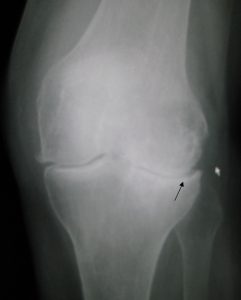
By James Heilman, MD via Wikimedia Commons
Hey, what were you doing on Sunday morning, December 3? I know what I was doing – I was on the air with my colleague Dr. Rawad Nasr – and we were talking about arthritis. Dr. Nasr is a rheumatologist and the hour on the air just flew by. We had so many questions that we only got to a small fraction of them.
I guess you all want to learn about arthritis!
I’ve been promising to do a post with Dr. Nasr’s answers to some of the questions we didn’t get to that morning. I asked him to give written answers to listener questions, and he has begun that huge task, so the first batch of questions is here!
I do invite you to listen to the actual audio of the radio broadcasts, which are conveniently available as podcasts, without commercial breaks, for you to listen to on your computer or mobile device. To do that, click this logo to reach the main podcast page, then select Healthy Matters show #465, December 3, 2017.
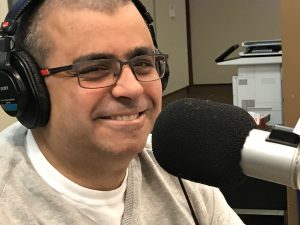
Dr. Rawad Nasr
First, a bit about Dr. Nasr and the specialty of Rheumatology. Dr. Nasr is a guy I’ve known since his training at HCMC in Minneapolis which is where I practice medicine. He was a quick learner, a smart doctor, a gifted teacher, and a genuinely good guy. Problem for us is that he and his family set up residence in Bemidji, Minnesota (up north, as we say in Minnesota). He practiced there for a few years and now we are so lucky that he is back with us at HCMC, seeing patients and teaching us all about connective tissue.
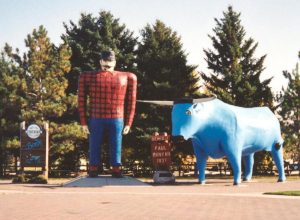
Bemidji’s most famous residents
Connective tissue? What the heck is that?
Connective tissues are the bones and muscles of your body. It is the realm of the rheumatologist. These specialists evaluate and treat things like osteoarthritis, rheumatoid arthritis (which is different), SLE (lupus), gout, and a host of autoimmune diseases. Dr. Nasr is just such a doctor.
Want to get in to see Dr. Nasr as a patient? Here’s his bio and here’s the page for the Rheumatology Clinic. I recommend him highly.
So let’s get to the questions! These questions are taken verbatim from the WCCO studio text message line and the responses are directly from Dr. Nasr.
Q: I have psoriatic arthritis. At the age of 34 I lost a kidney to cancer. I’m 58 now. I have been on heavy meds for years. Enbrel -5 years, Remicade – 1 year, Orencia – 7 years and now Humira 3 months. What kind of damage are these drugs doing to my immune system? Anything new coming out?
Dr. Nasr: If you are tolerating these drugs and having no side effects from their intake then these drugs are not damaging your immune system. These drugs modulate the immune system to treat the disease. Other medications for psoriatic arthritis include: Cimzia, Simponi, Cosentyx, Stelara and recently Xeljanz, a medication for rheumatoid arthritis, was approved for psoriatic arthritis.
Q: Tell us about the surgery to fix thumb arthritis.
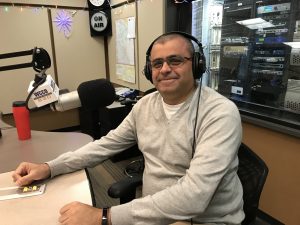
Rheumatologist Rawad Nasr
Dr. Nasr: When nonpharmacologic and pharmacologic options do not result in adequate relief of symptoms, we refer patients for surgical management. Available surgical techniques for thumb arthritis include trapeziometacarpal arthrodesis, trapeziectomy (with or without ligament reconstruction and tendon interposition [LRTI]), and trapeziometacarpal joint replacement. Arthrodesis means immobilization of the thumb joint with fusion of the bones. Trapeziectomy is to remove the trapezium bone. And the last option means joint replacement.
Q: Is there a medication that can slow down the arthritis?
Dr. Nasr: It depends on the type of arthritis. For example if a patient has rheumatoid arthritis then there are medications which keep rheumatoid arthritis quiet and prevents damage to joints. If a patient has osteoarthritis, at this point of time, there are no medications which reverse or slow down osteoarthritis though current studies are looking into potential medications which could do that.
Q: When I was in my teens and had a mouth flare up, tests were done and the doctors never figured it out but one of the tests indicated I had the “rheumatoid arthritis factor,” something to think about when I’m older. I am a 66y female. What is it and are their symptoms I should be aware of? My great aunts had crippled hands.
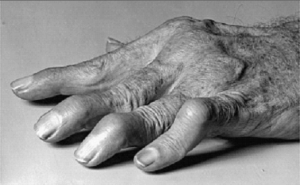
Swan neck deformity is sometimes seen in rheumatoid arthritis. By Abdulaziz Alkander via Wikimedia Commons
Dr. Nasr: Having a positive rheumatoid factor does not mean the patient has rheumatoid arthritis associated with the positive rheumatoid factor. Some patients get positive rheumatoid factor because of aging since as we age our immune system ages with us and thus some proteins produced by the immune system like rheumatoid factor increases in the blood. Other causes of positive rheumatoid factor include hepatitis B, hepatitis C, Sjogren’s disease and paraproteinemias. Other patients do have rheumatoid arthritis where the positive rheumatoid factor is present and inflammatory arthritis is present on physical exam.
Q: What effect does cracking your fingers have on your finger joints?
Dr. Nasr: Cracking your finger: have no effect on your finger joints. If a patient has hypermobility joint syndrome the main thing we tell the patient not to overuse the joint to the extent of injury.
Q: Pinky finger seems swollen and hurts to bend it. This is the only finger. Is this arthritis?
Dr. Nasr: This could be arthritis or it could be due to other causes like swelling of the finger tendons or trigger finger. Physical exam of the pinky finger could help determine the cause
Q: Is trigger thumb like arthritis?
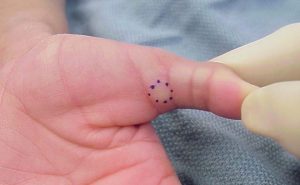
Nodule from trigger thumb. By JoJoEMC via Wikimedia Commons
Dr. Nasr: Trigger thumb is not arthritis. It is due to nodule formation in the tendon of the thumb which could be genetic or due to overuse. The nodule in the tendon causes the thumb to lock causing the trigger thumb.
Q: A family member has used cannabis cream for arthritis, please speak to that.
Dr. Nasr: Currently there is no clear evidence of cannabis to treat arthritis in clinical studies. Having said that, cannabis is known to help pain and could help pain from arthritis or other causes of pain. There are studies that show cannabis could help arthritis on the molecular level however clinical studies involving patients are needed to establish the efficacy of cannabis for arthritis.
Q: Please stop talking about symptom relief and start talking about prevention! Even if it’s not proven – are there ideas we can try?
Dr. Nasr: Prevention of arthritis starts with healthy diet, aerobic exercise and good sleep habits which constitute the basis of prevention for any disease. There is a lot of confusion about what a healthy diet would constitute. We know for sure that gluten free diet helps celiac disease and celiac disease related arthritis. Also we know that red meat, shellfish, fructose containing beverages like sodas and pop, and beer exacerbate gout which is a form of arthritis. On the other hand, cherry juice, low fat dairy products and caffeine decrease gout attacks. Red wine was neutral in increasing or decreasing gout attacks. For healthy diet, the Mediterranean diet has recently been found to decrease cardiovascular risks on a population level which is basically less red meat and less dairy products and more vegetables, nuts and fruits.
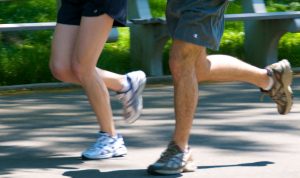
Ed Yourdon via Wikimedia Commons
Q: I’m 50 years old and very active running, biking, and swimming. Very painful knees and hips set in this summer to the extent that I couldn’t work out or sleep. Someone suggested I go gluten free. Within 72 hours pain was gone. I suggested it to my 85 year old mother. Same results. I’m wondering how many are the same?
Dr. Nasr: Gluten free diet for sure helps celiac disease and celiac disease related arthritis. There is no clear evidence of gluten free diet helping other forms of arthritis in terms of clinic studies. Having said that, there are patients who report that the pain and swelling in the joints improve after trying the gluten free diet. However we do not know if for these patients where the gluten free diet helps the symptoms if it would help decrease the risk for damage to joints long term.
OK, that’s the first 10 questions of the several dozen we received but didn’t answer on the show. Dr. Nasr and I will put together a future post to tackle more arthritis questions, so if you sent a question to us on December 3, be sure to check back on MyHealthyMatters. Maybe you’ll see your question!
Thanks to Dr. Rawad Nasr for taking time to help us all learn something, and to you for checking in here at MyHealthyMatters!
Subscribe by e-mail below or at the top of this page, and follow me on Twitter @DrDavidHilden.
Happy New Year!
David

